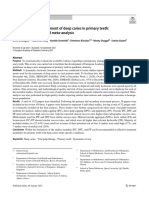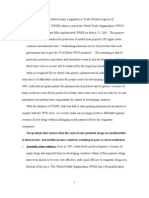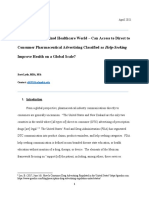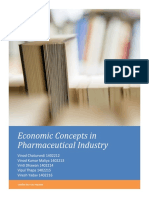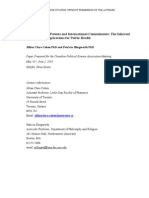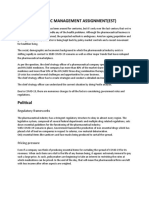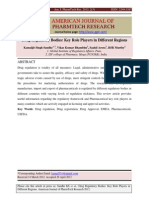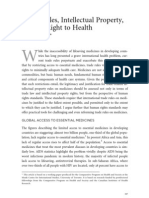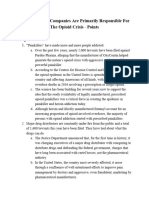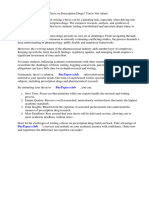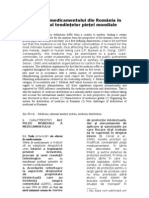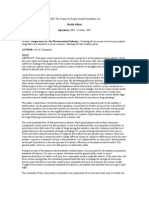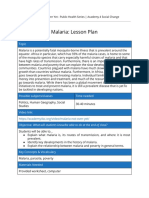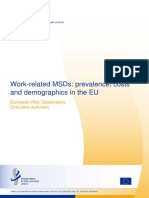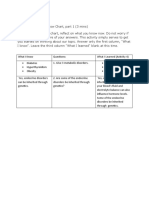Pro Drug-pro 赵晨宇
Pro Drug-pro 赵晨宇
Uploaded by
aroay071221Copyright:
Available Formats
Pro Drug-pro 赵晨宇
Pro Drug-pro 赵晨宇
Uploaded by
aroay071221Original Title
Copyright
Available Formats
Share this document
Did you find this document useful?
Is this content inappropriate?
Copyright:
Available Formats
Pro Drug-pro 赵晨宇
Pro Drug-pro 赵晨宇
Uploaded by
aroay071221Copyright:
Available Formats
Standing for the pro, we firmly believe that it is reasonable to abolish drug patents.
Definition
According to Cambridge University Press, a drug is defined as “a substance that can be taken
into the human body and, once taken, alters some processes within the body” and can be used in
the “diagnosis, prevention, or treatment of a disease” . This highlights the potential for drugs to
significantly improve health and well-being.
Merriam-Webster defines a patent as a “document granting an inventor sole rights to an
invention” for a limited period, often up to 20 years . This right can prevent others from making,
using, or selling the invention without permission.
Combining these definitions, we can frame the concept of a drug patent as:
“A legal protection granted to pharmaceutical companies that allows them exclusive rights to
manufacture and sell a drug for a certain period, ensuring they can recoup development costs
and generate profits.”
Framework
On pro, we believe the judge should evaluate the debate round with the assumption that the
policy should take into full consideration of current situations and more social well-being to the
majority of the public. The team that wins this debate should be the one that considers all sides
and balances the benefits of all stakeholders properly.
Contention 1: Accessibility
Drug patents create significant barriers to access to essential medications, particularly in low-
income regions. The high costs of patented drugs often make them unaffordable for many
individuals and healthcare systems, leading to preventable suffering and death. A report by the
World Health Organization (WHO) highlights that approximately 2 billion people lack access to
essential medicines due to high prices and patent protections. When patents are abolished,
generic manufacturers can produce and sell medications at a fraction of the cost, dramatically
increasing accessibility and affordability. In India, for example, the production of generic anti-
retro-viral drugs led to a significant decrease in the cost of HIV treatment, making it accessible to
millions more people. Therefore, abolishing drug patents would enhance global health equity by
ensuring that life-saving medications are available to all who need them, regardless of their
economic status.
Contention 2: Cost Reduction
The cost of healthcare can be drastically reduced by abolishing drug patents. Patented drugs are
often sold at exorbitant prices to maximize profits, which places a financial burden on both
patients and healthcare systems. Data from the Journal of the American Medical Association
(JAMA) indicates that the cost of patented drugs is, on average, 4.5 times higher than that of
generic versions. For instance, the introduction of generic drugs has led to significant cost savings
for the U.S. healthcare system—an estimated $1.67 trillion over the past decade. By abolishing
drug patents, we can facilitate the production of affordable generics, thus reducing overall
healthcare costs and enabling more sustainable healthcare systems. This would allow funds to be
allocated to other critical areas such as research and development for new treatments, improving
the overall quality of care.
Contention 3: Ethical Considerations
The current patent system prioritizes profit over human life, raising serious ethical concerns. The
fundamental goal of healthcare should be to save lives and improve the quality of life, not to
generate maximum profit. When pharmaceutical companies are granted monopolies through
patents, they can set exorbitant prices that many cannot afford, effectively placing profits above
patient welfare. The case of insulin in the United States is a prime example: despite being
discovered nearly a century ago, the price of insulin has skyrocketed due to patent manipulation,
making it unaffordable for many diabetics. Abolishing drug patents would realign the focus of the
pharmaceutical industry towards its ethical responsibility to prioritize patient health and well-
being over financial gain. 1. Eli Lilly and Company: 2. Novo Nordisk 3. Sanofi These companies
control the majority (90%) of the insulin supply in the U.S. market and have a significant influence
on the pricing and availability of insulin products.
In conclusion, abolishing drug patents would significantly improve access to essential
medications, reduce healthcare costs, and address ethical concerns associated with prioritizing
profits over patients. This shift would ultimately lead to a more equitable and effective healthcare
system, benefiting society as a whole.
This pro argument focuses on the ethical, financial, and accessibility benefits of abolishing drug
patents, providing a balanced perspective that aims to address the needs of all stakeholders.
The benefits of abolishing drug patent are far from being fully listed in my short speech, and
putting an end to drug patent deserve further attention and appeal.
瞎子注意 这是 CON 的观点 但是这个文件是 PRO 的文件!Contention4:Drug Safety
For the drug safety, the potential addiction of generic drugs and branded drugs does not have a
significant difference because the potential addiction only due to the active ingredients. (For
example the active ingredients of opioid are almost the same. So the potential addiction of GD
and BD are quite similar .) And there is a data for the example: According to the CDC, in 2020,
nearly 69,000 people died from opioid overdoses in the United States. Both generic and
branded opioids contribute to these figures.
https://www.cdc.gov/nchs/pressroom/nchs_press_releases/2021/20210714.htmIf the
government wants to cut down the phenomenon of overdose and addiction, that means the
government should not abolish the drug patents. Because the drug patents can control addiction
and overdose by decreasing the access to generating generic drugs . Another example of the
drug safety is The 2020 NSDUH report indicated that 16.1 million people aged 12 or older
misused prescription psychotherapeutic drugs in the past
year.https://www.cdc.gov/nchs/pressroom/nchs_press_releases/2021/20210714.htmSo how
can this circumstance happened so severely? If we don’t abolish the drug patents this
circumstance will be alleviated because when drug patents are applied successfully at once, the
awareness of paying attention to the prescription drug will arise immediately and the drug
oxycontin is the most typical example for it.According to the FDA, since the reformulation of
OxyContin in 2010, abuse incidents have decreased by approximately 20% to 30%.
https://pubmed.ncbi.nlm.nih.gov/25760692/ But if we do not abolish the drug patents, the
number of abusing drugs will decrease and the people dead from abusing will decrease as well.
You might also like
- Contemporary Management of Deep Caries in Primary Teeth: A Systematic Review and Meta AnalysisDocument31 pagesContemporary Management of Deep Caries in Primary Teeth: A Systematic Review and Meta AnalysisPatrícia BittencourtNo ratings yet
- Vaccine Peer Review 1000 PDFDocument1,053 pagesVaccine Peer Review 1000 PDFJeffPrager100% (3)
- Test Bank For Medical Surgical Nursing Critical Thinking in Client Care 4th Edition Priscilla LeMonDocument307 pagesTest Bank For Medical Surgical Nursing Critical Thinking in Client Care 4th Edition Priscilla LeMonkanooj khan100% (1)
- Pharmaceutical Regulations - Essay 3Document8 pagesPharmaceutical Regulations - Essay 3Amanda100% (1)
- Characteristics of The Pharmaceutical IndustryDocument5 pagesCharacteristics of The Pharmaceutical IndustryrohanNo ratings yet
- Role of Ethics in Pharmaceutical IndustryDocument19 pagesRole of Ethics in Pharmaceutical IndustrySuresh KodithuwakkuNo ratings yet
- Ethics EssayDocument19 pagesEthics EssayjatinNo ratings yet
- An Ounce of Prevention or A Pound of Cure? Short-And Long - Run Effects of Pharmaceutical Patents On U.S. Health Care ExpendituresDocument8 pagesAn Ounce of Prevention or A Pound of Cure? Short-And Long - Run Effects of Pharmaceutical Patents On U.S. Health Care ExpendituresinventionjournalsNo ratings yet
- Patients Not Patents Drug Research and DevelopmentDocument12 pagesPatients Not Patents Drug Research and DevelopmentDouglas SantosNo ratings yet
- The Future of Pharmaceuticals in IndiaDocument11 pagesThe Future of Pharmaceuticals in IndiaPRAVEEN SINGH CHAUHANNo ratings yet
- Pharmaceuticals Executive SummaryDocument10 pagesPharmaceuticals Executive SummaryPradyot78No ratings yet
- Right To Health As Basic Human Right and IPRDocument11 pagesRight To Health As Basic Human Right and IPRNehaNo ratings yet
- India Became A Signatory To Trade-Related Aspects ofDocument13 pagesIndia Became A Signatory To Trade-Related Aspects ofBiofamilyNo ratings yet
- Thesis About Generic DrugsDocument7 pagesThesis About Generic Drugsfc2thaq4100% (2)
- Policy in A Globalized Healthcare World - Can Access To Direct To Consumer Pharmaceutical Advertising Classified As Help-Seeking Improve Health On A Global ScaleDocument38 pagesPolicy in A Globalized Healthcare World - Can Access To Direct To Consumer Pharmaceutical Advertising Classified As Help-Seeking Improve Health On A Global ScaleScott LytleNo ratings yet
- Access To MedicinesDocument20 pagesAccess To MedicinesharuanimiNo ratings yet
- Pest Analysis of Pharmaceutical Industry:: DefinitionDocument7 pagesPest Analysis of Pharmaceutical Industry:: DefinitionPankaj JhaNo ratings yet
- Pharmaceutical Policy Action PlanDocument9 pagesPharmaceutical Policy Action Planapi-581236671No ratings yet
- Economics of The Pharmaceutical IndustryDocument12 pagesEconomics of The Pharmaceutical IndustrySambasiva RaoNo ratings yet
- Cohen Ill Ing WorthDocument18 pagesCohen Ill Ing WorthManan PatelNo ratings yet
- HIV/AIDS: A Case Study of Patient Rights Over Patent RightsDocument23 pagesHIV/AIDS: A Case Study of Patient Rights Over Patent RightsZhihong XuNo ratings yet
- A PESTLE Analysis For The Pharmaceutical Industry: Sanofi-Merck-CoDocument5 pagesA PESTLE Analysis For The Pharmaceutical Industry: Sanofi-Merck-Copayal joshi100% (1)
- Prescription Drugs Research Paper TopicsDocument7 pagesPrescription Drugs Research Paper Topicsgwfdurbnd100% (1)
- Strategic Management Assignment (Est) : Regulatory FrameworksDocument4 pagesStrategic Management Assignment (Est) : Regulatory FrameworksIshaan KumarNo ratings yet
- Ethical Challenges in The Pharmaceutical Industry: Pharmaceuticals Policy and Law April 2012Document7 pagesEthical Challenges in The Pharmaceutical Industry: Pharmaceuticals Policy and Law April 2012RizwanNo ratings yet
- The Global Pharmaceutical IndustryDocument8 pagesThe Global Pharmaceutical IndustryVelan10No ratings yet
- An20230402 660Document6 pagesAn20230402 660syedah sheezahNo ratings yet
- FinalargdraftDocument6 pagesFinalargdraftapi-356547596No ratings yet
- The Price of A DrugDocument3 pagesThe Price of A DrugcomarcadosNo ratings yet
- Economics of The Pharmaceutical IndustryDocument12 pagesEconomics of The Pharmaceutical IndustryViresh YadavNo ratings yet
- Editorial: Ethical Challenges in The Pharmaceutical IndustryDocument6 pagesEditorial: Ethical Challenges in The Pharmaceutical IndustryKartheepan ThavarasasingamNo ratings yet
- AJPTR Article Kamaljit Singh - 5537Document30 pagesAJPTR Article Kamaljit Singh - 5537sherepunjabNo ratings yet
- Assignment 1Document3 pagesAssignment 1Alfie16No ratings yet
- Magic Medicine and Related LawsDocument3 pagesMagic Medicine and Related Laws0000No ratings yet
- Pharmaceutical Marketing - Time For ChangeDocument8 pagesPharmaceutical Marketing - Time For ChangeFabio PellimNo ratings yet
- Pfizer PBC BookletDocument7 pagesPfizer PBC BookletDon HeymannNo ratings yet
- Big PharmaDocument5 pagesBig PharmaChadwig Walter OtienoNo ratings yet
- NOVARTIS PharmaceuticalDocument7 pagesNOVARTIS PharmaceuticalJames FosterNo ratings yet
- Text 5 - Geaghan-Breiner 2021-1Document40 pagesText 5 - Geaghan-Breiner 2021-1Poubelle MailNo ratings yet
- TH e Human Right To Health, Access To Patented Medicines, and The Restructuring of Global Innovation PolicyDocument81 pagesTH e Human Right To Health, Access To Patented Medicines, and The Restructuring of Global Innovation PolicyDiah ArimbiNo ratings yet
- Minor ProjectDocument53 pagesMinor Projectpatelvraj308No ratings yet
- The Analysis of Pharmaceutical MarketDocument10 pagesThe Analysis of Pharmaceutical MarketAnamaria BejenariuNo ratings yet
- Avoidable Costs in HealthcareDocument62 pagesAvoidable Costs in HealthcareAnthony WilsonNo ratings yet
- Protecting Biopharmaceutical Innovation Means Hope For New Treatments For PatientsDocument4 pagesProtecting Biopharmaceutical Innovation Means Hope For New Treatments For PatientsPatientsPatentsNo ratings yet
- Pharmaceutical Patenting in India: Problem of Public Access To HealthDocument11 pagesPharmaceutical Patenting in India: Problem of Public Access To Health121933101040 VENKATA SAI RAMPELLINo ratings yet
- Lisa Forman Trade Rules and Human RightsDocument21 pagesLisa Forman Trade Rules and Human RightsVictor Zamora Mesía100% (1)
- Economics of Pharmaceutical Sector Lecture 1: General Structure of The Economic System in The Pharmaceutical Sector Dr. Heba SolimanDocument23 pagesEconomics of Pharmaceutical Sector Lecture 1: General Structure of The Economic System in The Pharmaceutical Sector Dr. Heba SolimanBasma ElshazlyNo ratings yet
- AARP AHIP BCBS PSMA Joint Letter (7!9!15)Document3 pagesAARP AHIP BCBS PSMA Joint Letter (7!9!15)Argentum PharmaceuticalsNo ratings yet
- Pharmaceutical Companies Are Primarily Responsible For The Opioid Crisis - PointsDocument5 pagesPharmaceutical Companies Are Primarily Responsible For The Opioid Crisis - Pointsjigneshreddy20No ratings yet
- 1Document18 pages1PHƯƠNG HUỲNH ANHNo ratings yet
- Generic DrugDocument8 pagesGeneric DrugNur Md Al HossainNo ratings yet
- pharmaceutical patentingDocument8 pagespharmaceutical patentingnipayet420No ratings yet
- New Pricing Policy For Speciality Drugs 5.12.2015Document14 pagesNew Pricing Policy For Speciality Drugs 5.12.2015Janet Zimmerman McNicholNo ratings yet
- Research Paper Topics Prescription DrugsDocument4 pagesResearch Paper Topics Prescription Drugsvevuf1zad1w2100% (1)
- Drug Information Bulletin 25 05Document4 pagesDrug Information Bulletin 25 05amritaryaaligarghNo ratings yet
- Case Study 1Document16 pagesCase Study 1aleestudiando01No ratings yet
- Distribu Ţia Medicamentului Din România În Contextul Tendinţelor Pieţei MondialeDocument12 pagesDistribu Ţia Medicamentului Din România În Contextul Tendinţelor Pieţei MondialeuspitiNo ratings yet
- 2Document10 pages2api-3711225No ratings yet
- The Truth About the Drug Companies: How They Deceive Us and What to Do About ItFrom EverandThe Truth About the Drug Companies: How They Deceive Us and What to Do About ItNo ratings yet
- C Yclothymic OCD: A Distinct Form?Document10 pagesC Yclothymic OCD: A Distinct Form?Rivanli PoliiNo ratings yet
- Malaria LessonDocument3 pagesMalaria LessonElegence 63No ratings yet
- Stoelting Anasthesia and Co Existing Disease PDFDocument28 pagesStoelting Anasthesia and Co Existing Disease PDFEgidia SetyaNo ratings yet
- Work Related MSDs Prevalence Costs and Demographics in EU SummaryDocument18 pagesWork Related MSDs Prevalence Costs and Demographics in EU SummaryLia GNo ratings yet
- ASD Comparison Information Brief PDFDocument6 pagesASD Comparison Information Brief PDFMaryam BehramNo ratings yet
- TATC - 27 Foods That Help Prevent & Heal CancerDocument46 pagesTATC - 27 Foods That Help Prevent & Heal Cancerlucaste50No ratings yet
- Carbo VegetabilisDocument6 pagesCarbo VegetabilisSuhas IngaleNo ratings yet
- Management of Multiple Traumas in Emergency Medicine Department, A Review 2019Document9 pagesManagement of Multiple Traumas in Emergency Medicine Department, A Review 2019Jesús GonzálezNo ratings yet
- Cadayona-Clinical Sas 4Document33 pagesCadayona-Clinical Sas 4kateNo ratings yet
- CHCECE002: Ensure The Health and Safety of ChildrenDocument13 pagesCHCECE002: Ensure The Health and Safety of ChildrenHNo ratings yet
- Bioorganic & Medicinal Chemistry LettersDocument4 pagesBioorganic & Medicinal Chemistry LettersMarcelo GanozaNo ratings yet
- Infection UMMP PDFDocument138 pagesInfection UMMP PDFShafiah Aqilah Mohd JamalNo ratings yet
- Nutritional Strategies in Acute PancreatitisDocument19 pagesNutritional Strategies in Acute PancreatitisSyed Irfan ArifNo ratings yet
- Primary Maxillary and Mandibular ImpressionsDocument18 pagesPrimary Maxillary and Mandibular ImpressionsanushiNo ratings yet
- Antepartum AssessmentDocument14 pagesAntepartum Assessmentamena mahmoudNo ratings yet
- Diffuse Astrocytomas: Dr. Samuel OlukaDocument29 pagesDiffuse Astrocytomas: Dr. Samuel OlukaSam OlukaNo ratings yet
- ARGMD Part 3, Post-Market (Devices-Argmd-P3) PDFDocument41 pagesARGMD Part 3, Post-Market (Devices-Argmd-P3) PDFsss7385No ratings yet
- 4 Gcse Edexcel BiologyDocument17 pages4 Gcse Edexcel BiologyRumana KhanNo ratings yet
- C Ovid 19 Treatment GuidelinesDocument459 pagesC Ovid 19 Treatment GuidelinesRamya RSNo ratings yet
- Bipolar Mood DisorderDocument7 pagesBipolar Mood DisorderMary Rose Silva GargarNo ratings yet
- SehadetaDocument4 pagesSehadetasehadetavukovicNo ratings yet
- A Case of - Twin Gestation With OneDocument31 pagesA Case of - Twin Gestation With OneMD Nazar ImamNo ratings yet
- Path-SARS-CoV-2 Winterplex IFU Issue 11.02Document36 pagesPath-SARS-CoV-2 Winterplex IFU Issue 11.02nazmiNo ratings yet
- Toxoplasma Gondii ClassDocument30 pagesToxoplasma Gondii Classshrestharohan007No ratings yet
- Grupo 2 Sinjab 2018Document6 pagesGrupo 2 Sinjab 2018m.castillo11No ratings yet
- The Evolution of Selective Dorsal Rhizotomy For The Management of SpasticityDocument6 pagesThe Evolution of Selective Dorsal Rhizotomy For The Management of SpasticityJessica MaiaNo ratings yet
- Instruments: 1. Vim Silver Man'S Biopsy Needle For Liver Biopsy Two MethodsDocument11 pagesInstruments: 1. Vim Silver Man'S Biopsy Needle For Liver Biopsy Two Methodstasneem faizaNo ratings yet
- Drugs 1 QP Cie Igcse PMTDocument13 pagesDrugs 1 QP Cie Igcse PMTAala SolihNo ratings yet
